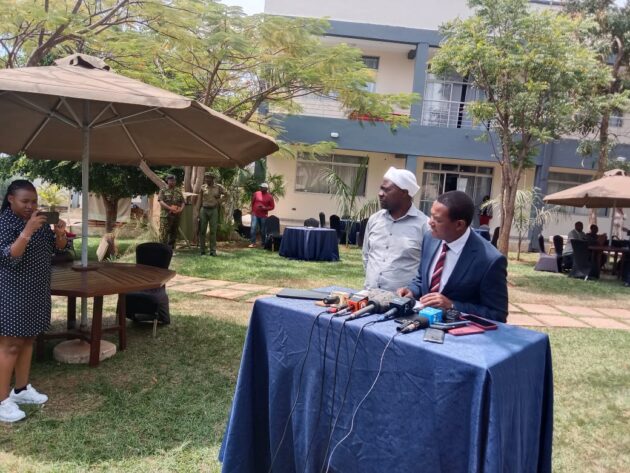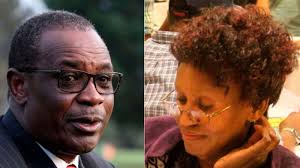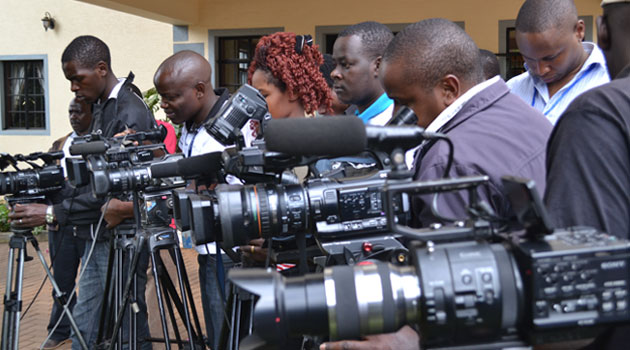Jimmy Cherizier, known universally as “Barbecue”, says If the Kenyan military or police move into the streets of Haiti he would “consider them as aggressors”.
The head of one of Haiti’s most powerful gangs, and the de-facto head of a consortium of gangs that have brought Port-au-Prince to a standstill has told Sky News he would consider a ceasefire and talks on the political future of the country if they were included.
But Jimmy Cherizier, known universally as “Barbecue”, has predicted that more violence is imminent, adding that a recent halt in the fighting is purely a technical pause.
“There is nothing calm, but when you’re fighting you have to know when to advance and when to retreat,” he said.
“I think every day that passes we are coming up with a new strategy so we can advance, but there’s nothing calm.
“In the days that are coming things will get worse than they are now…” he told me sitting in an alleyway in his stronghold.
Political parties in Haiti, overseen by CARICOM, the Caribbean economic union of countries, are trying to form a transitional council that will take over the running of the country after the Prime Minister Ariel Henry, who is currently in the United States, stands down.
Cherizier has said they “respect CARICOM a lot” but dismissed the process as unrepresentative of the needs of the ordinary people and a smokescreen to allow “corrupt politicians” and what he calls “corrupt oligarchs” to continue running the country.
The only way the situation can move on, he insisted, is if the peace process includes him and his gang coalition.
“If the international community comes with a detailed plan where we can sit together and talk, but they do not impose on us what we should decide, I think that the weapons could be lowered,” he added.
Advertisement
“We don’t believe in killing people and massacring people, we believe in dialogue, we have weapons in our hand and it’s with the weapons that we must liberate this country.”
Haiti has been paralysed by weeks of violence that has seen whole districts burnt to the ground, tens of thousands of people displaced from their homes, while murder, rape, and gun battles are a daily occurrence.
Port-au-Prince is 80% controlled by the gangs and normal life has virtually stopped.
To get to Barbecue we were guided down a now-deserted motorway pockmarked with burnt out sections of tarmac and abandoned and burnt-out vehicles.
It’s one of the main economic highways in the capital, and now totally under his control.
We were told that their snipers were watching us, and to drive slowly, and follow our guide’s every move.
We then turned off the main road and drove through a warren of backstreets, to a meeting point where we were greeted by a group of armed gunmen in balaclavas.
I’ve met Barbecue before, and I knew where we were going, but everything was different this time – that deserted highway was free flowing the last time I was here. Now it is a barricaded battlefield.
Another difference is that last time we met, he wasn’t too keen on us filming his armed guards, but now he positively wanted us to see them, and was carrying two weapons himself.
The reason is simple. He is at war, and he wants the authorities and his enemies here to know that it is a war.
He’s not responsible for all the violence sweeping across Haiti’s capital but, be under no doubt, he is at the centre of it and his fighters are never far away.
Barbecue sees himself as a revolutionary for the people, and he rails against corrupt politicians and oligarchs.
He has dismissed all the efforts under way here to form a transitional council that will govern Haiti.
“We believe in dialogue, we are for dialogue, but this political class that is here now is not here for dialogue, the reason is that they don’t carry Haiti in their hearts the same way that we do.
“The political class say they are excluding bandits, that men with guns are not in it, but this is a way for them to revive the same system, because the system has reached its end.
“The divide between rich and poor is too vast, in the whole world there is a divide between rich and poor, but the way it’s done in Haiti is indecent,” he told me.
He suggested though, that he is open to some form of negotiations as long as they’re represented.
“We are ready for all solutions as long as Haitians are at the table, we are ready to sit and talk with everyone, because we are not proud of what is happening in this country…”
I asked him if he accepts that if they want to have talks, they’ll have to put down their weapons.
“The weapons will be lowered when they need to be lowered,” he replied.
“At the moment we haven’t got to the point where we should put down our weapons, because the people here don’t want to listen to reason.
“We have been hearing about dialogue for more than two or three years.
“We’ve been asking for everyone to sit down and talk to the people with guns, and no one heard us. Today we have reached the point where we are advancing and our objective is clear.”
Surrounded by well-armed gunmen, Barbecue took me for a walk around some of his newly acquired territory.
He took us through the roadblocks of buses they’ve put in place to stop police raids here.
He says the last major police assault was eight days ago and he’s not sure when there will be another.
Inside his territory, despite the poverty, life is relatively peaceful and organised.
Barbecue said we should see food distribution taking place inside his community.
And unlike what we have seen in other parts of Port-au-Prince, the queues for the food Barbecue gets brought in are orderly.
The essential difference is the people waiting in line know there’s enough food and water supplies for the whole community. They just need to wait.
The issue here though is whether a poor area, controlled by a gang boss, is getting better treatment than poor areas controlled by the government.
This is the source of Barbecue’s strength.
Cherizier, a former policeman, sees himself as a sort of revolutionary freedom fighter in the style of Che Guevara, and a Robin Hood type figure for his community.
For much of the international community though, and many in Haiti, he is a criminal gang leader.
Watched on by his well-armed and battle-hardened soldiers, Barbecue says plans for an international force led by Kenya to impose peace in Port-au-Prince will lead to more violence, whoever is in charge.
When I met him last in January 2023 I asked about foreign forces. He said at the time innocent people would die if they came in. I wondered if he still held the same view.
“I believe that just like I said, if the Kenyans come, first of all they will come to commit massacres in the poor communities, because the oligarchs and the corrupt politicians are going to tell them where to go on the pretext that they’re coming to eliminate gangs and bandits, and they’re going to enter the poor communities to commit massacres,” he said.
“We at this moment who have weapons in our hands are not going to allow this.
“It’s evolving. If the Kenyan military or Kenyan police come, whatever, I will consider them as aggressors, we will consider them as invaders, and we do not have to collaborate with any invaders that have come to walk over our independence.”
Barbecue is not only leader of the G9 group of gangs, he is now also the leader of Viv Ansanm (Living Together) revolutionary group, a newly formed gang alliance.
He said he’s trying to reign the more violent gangs in, and that they need to change their ways or risk losing their revolution.
“Viv Ansanm is a collective leadership – I can’t force them. If I use force against them it will be an endless fight, we will never be able to accomplish what we want to against the people who have created this situation,” he explained.
“But every day every day we talk seven or eight times on the phone, and each time we hear on the news that they kidnap someone or something bad is done.
“I always call the guys on the phone to see how together we can correct this, and even they who have been doing it are starting to be conscious that this is bad and that they’re not going to do it anymore.
“But me I just assure myself that I continue talking to them for them to stop and not continue to do it.
“I think in time we will find a solution with a country where there are no kidnappings, without raping and killing people, and in the end we will chase the corrupt politicians and the corrupt oligarchs out of the country.”
As we were getting ready to leave Cherizier paused to fly a kite.
It’s an early Easter tradition here. He laughed and joked with his people. He’s an unlikely hero but here in his territory he is.
In truth no ordinary society needs people like Barbecue, but Haiti isn’t normal.
How or when it achieves normality is impossible to predict.











